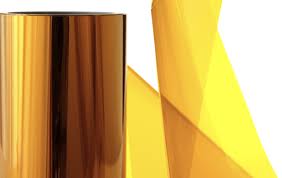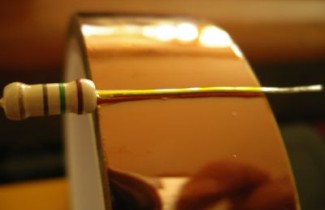Kapton® polyimide tape
Kapton® polyimide tape® (Kapton® is a registered trademark of DuPont) - is formed by polymerisation of aromatic dianhydride and aromatic thiamine. Kapton film can be used over a wide temperature range (-269°C ÷ +400°C) without losing its excellent physical, chemical and electrical properties. Kapton®tape is available in various versions according to its application. Kapton film is resistant to high temperatures and chemicals and is used to protect sensitive components (connectors, integrated circuits, sockets) during wave or hot air soldering.
Types of kapton film
The basic model is Kapton® HN material. The film is mainly used to insulate electric motors in H and super H classes, as well as in the production of adhesive tapes for dielectric applications and when resistance to very high or low temperatures is required.
The Kapton® FN model is a polyimide tape similar in structure to the HN model, but coated on one or both sides with Teflon FEP, which improves the chemical resistance of the material and adds to its exceptional thermal integrity. This model is used for wrapping copper wires and cables in high ambient temperature conditions.
Kapton® CR and Kapton® FCR models (additionally Teflon-coated) are polyimide tapes, designed to prevent the damaging effects of current leakage and chemical treatment and to minimise the risk of incomplete discharges (corona-volatiles).
Kapton MT® model - used wherever high thermal conductivity is important.
Kapton FPC® model - available in various versions, is used in the manufacture of flexible electrical circuits.
Parameters of Kapton film
Below is a summary of the most important mechanical and electrical parameters of 25 µm thick Kapton HN and FN, determined in accordance with ASTM standards:
| Parameter | Kapton HN | Kapton FN |
|---|---|---|
| Max. tensile strength [MPa] | 231 | 207 (w 23°C) 121 (w 200°C) |
| Total elongation [%] | 72 | 75 (w 23°C) 80 (w 200°C) |
| Density [g/cm3] | 1,42 | 1,53 |
| Dielectric strength [kV/mm] | 303 | 272 |
| Dielectric constant | 3,4 | 3,1 |
| Cross resistivity (volumetric) [Ω∙cm] | 1,5 × 1017 | 1,4 × 1017 (w 23°C) 4,4 × 1014 (w 200°C) |
The performance of Kapton film is influenced by its thickness, among other factors:
- operating temperature - the higher it is, the lower the dielectric strength, dielectric constant and cross resistivity,
- ambient humidity - as this increases, the dielectric strength decreases and the dielectric constant increases.
In the case of corona (fugitive) discharges, equipment insulated with Kapton tape is effectively protected for up to 3,000 hours - when the installation is protected with Kapton, a short-lived fugitive therefore does not endanger its components.
Kapton material is also distinguished by its high resistance to chemicals - its strength properties are only slightly affected by toluene, isopropyl alcohol, methyl ethyl ketone, hydrochloric acid, sodium hydroxide. In addition, it is resistant to fungi and slightly absorbs moisture.
Kapton has a high resistance to radiation and can therefore be used in installations used in nuclear power plants, as well as in equipment sent into space.
Application of Kapton material
As mentioned before, Kapton film is resistant to high temperatures and chemicals and is used to protect sensitive components (connectors, integrated circuits, sockets) during wave or hot air soldering.
It is often used in the servicing of mobile phones, laptops and other mobile devices, where it can be used to protect adjacent components and circuits from overheating or other damage during hot air soldering. Kapton material is also used in 3D printing.
Check also: Mylar film.
About the company
VOLTROG Sp. z o.o. was established in 1999, and at the time of its founding it dealt exclusively with the warranty service of transformers for their renowned manufacturers; at a later stage it began to implement technological solutions mainly concerning the cutting of soft and hard electrical insulating materials.

